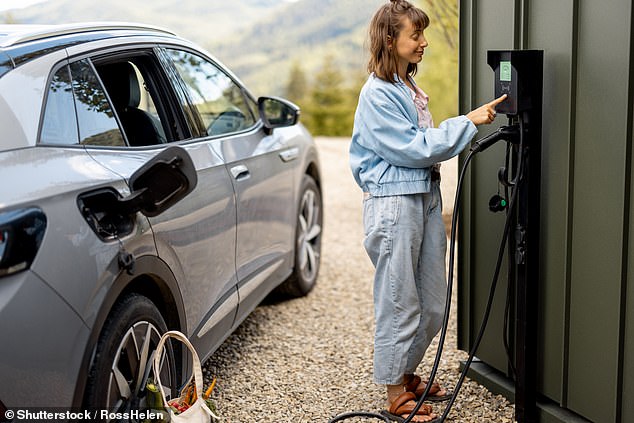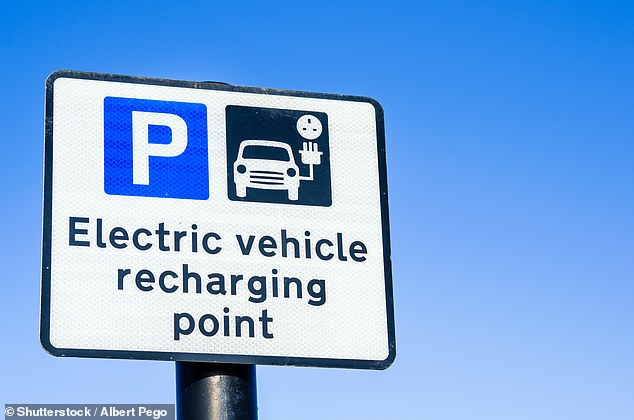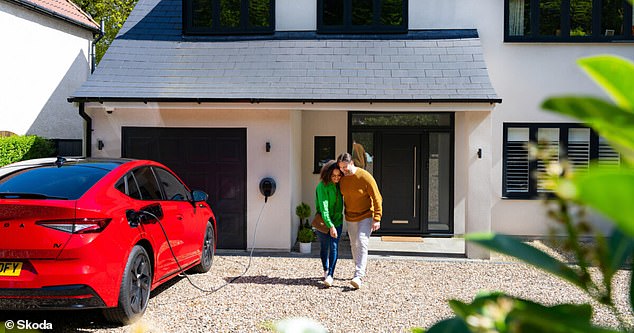The Government has cut planning red tape to make it easier for EV drivers and businesses to install electric car chargepoints.
Future of Roads Minister, Lilian Greenwood, announced drivers and businesses will no longer need to submit a planning application to install public or private EV sockets.
EV owners will be able to unlock savings of up to £1,100 a year compared to running a petrol or diesel car thanks to the streamlined new process, the Government says.
By cutting down on paperwork, more EV owners with a driveway will find it easier to install a home charger and power up their EVs at home.
Crucially, the planning changes also apply to workplace and public chargepoints meaning businesses will be able to install new sockets faster and for less money, increasing the number of public chargepoints.
Lilian Greenwood said: ‘We’re cutting down on paperwork to power up the EV revolution, so that drivers, businesses and those looking to make the switch will have more chargepoints to power from, and less red tape to deal with.’

Future of Roads Minister, Lilian Greenwood announced this week that drivers and businesses will no longer need to submit a planning application to install public or private EV sockets
Department for Transport (DfT) statistics show a record of nearly 3,000 public charging devices were added in April – with one popping up every 29 minutes.
Overall there are nearly 80,000 public chargepoints across the UK, with the Government helping to install 18,600 sockets in workplace carparks last year.
This week’s relaxation of planning process comes on top of the discounts the Government offers to drivers wanting to install chargepoints outside their house; currently people renting or owning a flat, or those with on-street parking can receive up to £350 off the cost of installing a home charger.
The red tape relaxation is part of Labour’s ‘Plan for Change’ which will see £2.3billion invested to help the switch to EVs, secure global trade deals to back British carmakers, and create jobs and drive investment.
Reacting to the news, industry leaders called it a ‘positive’ step but pushed for more to be done to help those without driveways.

EV owners will be able to unlock savings of up to £1,100 a year compared to running a petrol or diesel car thanks to the streamlined new process, the Government says
Vicky Edmonds, chief executive of EVA England, embraced the ‘welcome step forward’ saying: ‘Making it easier to install both public and private charging infrastructure is essential to helping more drivers switch to electric.’
However she warned ‘further action is needed’ as ‘drivers without driveways still face barriers to affordable, convenient charging’, adding: ‘We urge the Government to increase its support of the rollout of cross-pavement charging and extend legal rights to tenants and leaseholders, so all drivers can access and benefit from cheaper and more convenient charging.’
Jack Cousens, head of roads policy for The AA, believes ‘removing the planning rules’ will help ‘accelerate installations’ but is concerned about grid connection.
He commented: ‘The crucial element is ensuring grid connection in a timely manner. This is especially important in rural locations and areas where there is no dedicated off-street parking.’
Rocio Concha, director of policy and advocacy at consumer group Which? said any measures which remove the hassle and red tape preventing homeowners and companies from installing new electric vehicle chargers is ‘an important step in the right direction’.

Motorists using public charge points pay up to 10 times more than home off-peak charging rates as the driveway divide continues
How much does charging your EV at home save you?
Zapmap’s price index shows that those using public charging points are paying a hefty premium to charge compared to drivers with off-street parking and home chargers.
Motorists using public charge points pay up to 10 times more than home off-peak charging rates.
Ultra-rapid chargers cost around £0.80 per kWh compared to just £0.08 per kWh for home off-peak charging.
At the same time it was revealed that 80 per cent of EV drivers now charge at home, up from 76 per cent last year, while public charging hub usage has decreased to 29 per cent, down eight per cent from 2024.













